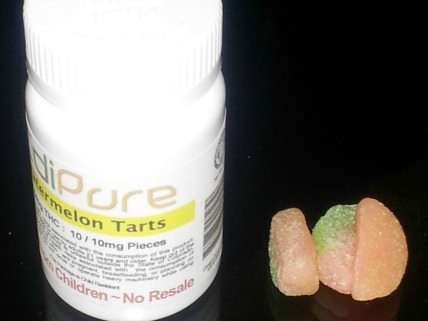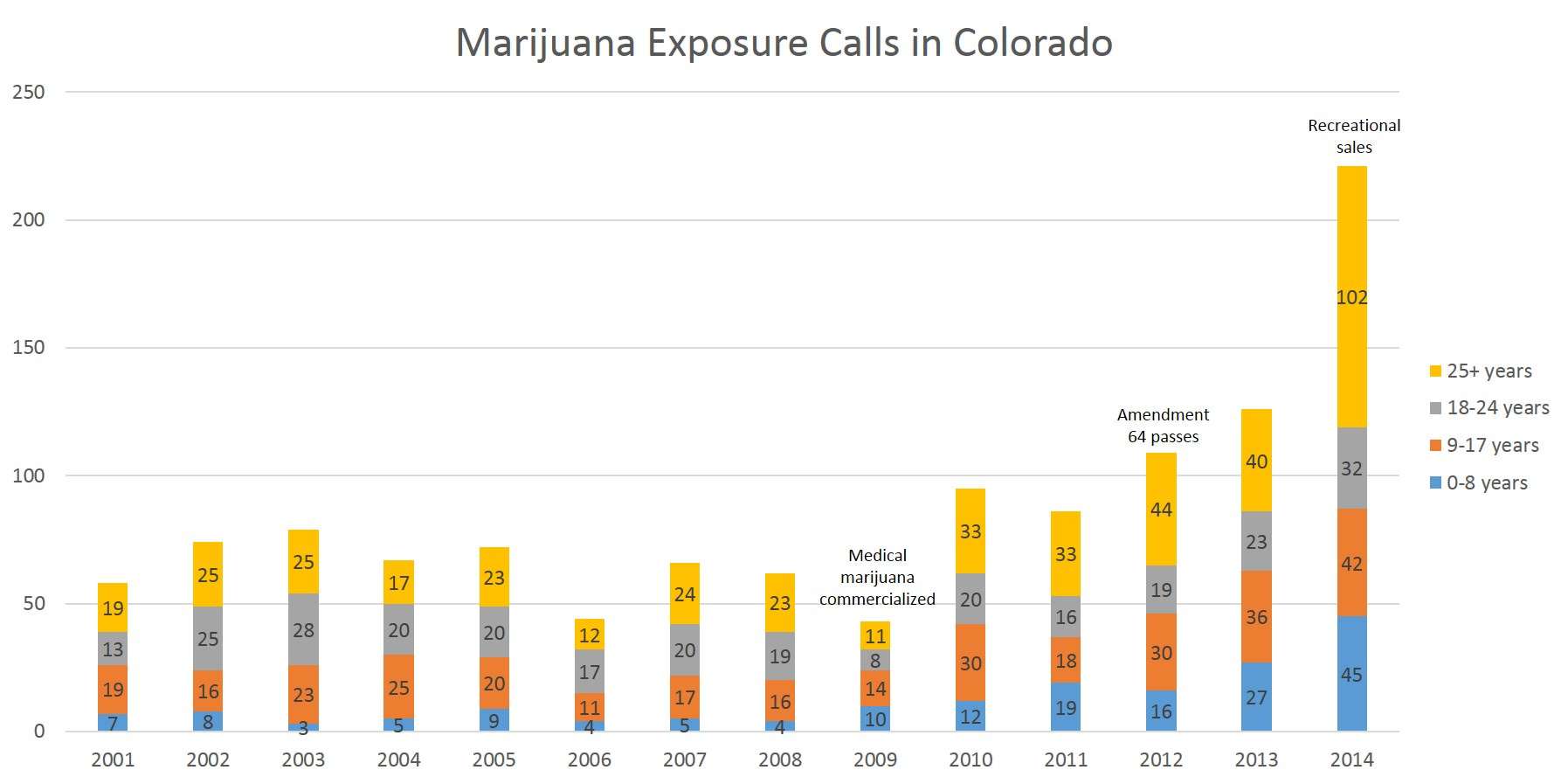Proposed Colorado Rules Require Stop Signs on Marijuana Edibles
Regulations also would ban the c-word from labels.

Last year, in response to concerns about unintentional ingestion of marijuana edibles, the Colorado legislature passed H.B. 1366, which requires that any such product "be clearly identifiable, when practicable, with a standard symbol indicating that it contains marijuana and is not for consumption by children." The Department of Revenue's Marijuana Enforcement Division, which is charged with issuing regulations to achieve that goal by January 1, is still trying to figure out exactly how. Rules proposed by a state-appointed working group last week would require that packages and, when feasible, the products themselves carry a red stop-sign symbol emblazoned with the letters THC to indicate the presence of marijuana's main psychoactive ingredient. Under the proposal, liquids and other unstampable products, such as granola and mixed nuts, would be sold only in single-serving packages containing 10 milligrams of THC. Under current regulations, packages for the recreational market can contain up to 100 milligrams, or 10 servings. The working group also proposed banning the word candy from the labels of marijuana edibles.
These rules are considerably less restrictive than last year's recommendation from the Colorado Department of Public Health and Environment that edibles be limited to tinctures and hard candies or lozenges. The department quickly withdrew that proposal, which even Rep. Jonathan Singer (D-Longmont), the chief sponsor of H.B. 1366, thought went too far. That was true for both legal and practical reasons: Amendment 64, which legalized marijuana for recreational use and is now part of the state constitution, clearly envisioned that adults 21 or older would be able to legally buy a wide variety of cannabis products. Furthermore, edibles have proven very popular among recreational consumers, and banning them would invite the proliferation of unregulated black-market alternatives.

Marijuana edibles are already clearly labeled as such and sold in child-resistant packages. H.B. 1366 aims to prevent people from mistaking them for ordinary foods after they are removed from their packages. The number of "marijuana exposure" calls to the Rocky Mountain Poison and Drug Center rose fivefold between 2009, when the medical marijuana industry started to take off, and 2014, when legal recreational sales began. Of the 221 cases last year, 134 involved people 18 or older, and it's plausible that at least some of them accidentally ingested a marijuana edible after it was removed from its package. In those cases, a THC stop sign stamped on the product might have made a difference. It is less clear whether that symbol would deter little kids who come across unwrapped edibles. Forty-five of last year's calls involved children 8 or younger. Presumably those accidents could have been avoided by better supervision or more careful storage of cannabis comestibles.
Fortunately, the consequences of accidentally ingesting marijuana are rarely serious. Data from the Washington Poison Center, which also has seen an increase in marijuana exposure calls since legalization, indicate that just 3 percent of cases involve a "major effect." Unsurprisingly, since no fatal marijuana overdoses have ever been documented, there have been no deaths. Still, unwitting consumption of any psychoactive substance obviously can be disconcerting and unpleasant. The question is the extent to which manufacturers (and consumers, via higher prices) should bear the burden of added precautions aimed at preventing something that does not happen very often, generally does not have very serious consequences, and already can be avoided with a modicum of consumer and parental care.
Editor's Note: As of February 29, 2024, commenting privileges on reason.com posts are limited to Reason Plus subscribers. Past commenters are grandfathered in for a temporary period. Subscribe here to preserve your ability to comment. Your Reason Plus subscription also gives you an ad-free version of reason.com, along with full access to the digital edition and archives of Reason magazine. We request that comments be civil and on-topic. We do not moderate or assume any responsibility for comments, which are owned by the readers who post them. Comments do not represent the views of reason.com or Reason Foundation. We reserve the right to delete any comment and ban commenters for any reason at any time. Comments may only be edited within 5 minutes of posting. Report abuses.
Please to post comments


This clearly should've been Mr. Yuck. Idiots.
Or Mr. Natural.
Regulations also would ban the c-word from labels.
Ken approves!
Presumably those accidents could have been avoided by better supervision or more careful storage of cannabis comestibles.
They absolutely could have been avoided by BANNING IT!
Because when you ban something, it just vanishes, right?
Marijuana should be re-legalized but not tax and regulated by the state.
I've seen many progressives with the idiotic idea of taxing and regulating the plant. Once the progressive bureaucrat mind gets a hold of the reefer, they will never let go.
Hmm - must make more regulators for the cannabis.
How much THC?
How many plants?
What should one plant weight before you can use it?
What kind of potting soil?
Is the smoke harmful to you?
How about mother earth?
It's not just progressives, but also less buttoned-up conservatives.
A lot of that is an attempt to shut it all down by the people who lost at the polls. They evidently prefer the black market model.
Once it is legal, how much time are the revenue agents going to spend chasing down people who grow their own plants? My guess would be none.
Do you really think that unfettered re-legalization has even the proverbial snowball's chance of being enacted? Heck, let's also make it mandatory for all U.S. citizens and legal residents to use it at least 3 times.
I saw a show where this was being discussed. Some nanny Mothers against everything group was spearheading it at least in that region. They wanted the actual product identified like an oreo cookie stamp. The bakers were balking at that of course but had no problem labeling packages. Anything that adds additional equipment to the process is problematic because buying expensive equipment is made more difficult by the fact that banks are scared to give these folks loans to buy the equipment because of the feds.
Being a baker seems to be getting a lot more legally complicated than it seems it should be.
"Oh, you never would believe where those edibles come from!
They're made by little elves in a hollow tree!
And what do you think makes those edibles so uncommon?
They're baked in magic ovens and there's *no factory*!"
Nobody really needs more than $20 at a time.
And no one proposing these rules are actual consumers of the products. Must resist urge to woodchip.
I like "Mothers Against Everything".
Maureen's Law.
The number of "marijuana exposure" calls to the Rocky Mountain Poison and Drug Center rose fivefold ... when legal recreational sales began.
*** deep breath ***
"Yes, I'd like to report a "marijuana exposure".
*** uncontrollable giggling ***
I wouldn't be surprised if the fear-mongers can't ride a nice bloodwave of moral panic and re-illegalize--or at least medicalize and require a prescription for--edibles and concentrates in some states.
They will attack on multiple levels: DUI, "ODs," the mere fact that you can be quite intoxicated on edibles with no smell, that edibles resemble candy and cookies... they will do whatever they have to.
It's making white women have sex with Mexicans!
And, of course, there is no discussion about whether the number of exposures has actually increased or if people are just more likely to seek medical attention when not afraid of being sent to jail as a result.
nobody gets the munchies for hospital food
You realize that those "crisis" levels of phone calls about being super-high are still less than one a day, right?
nobody gets the munchies for hospital food
Actually, we have a good diner-style grill in our hospital, and they do a decent pizza as well.
And don't get me started on their enchiladas, which are quite credible.
Plus, we actually do room service now.
Did anyone stop to think that with pot "legal," that "marijuana exposure calls" are likely to be much higher simply because the people who get crispy are less concerned about being branded criminals? Thankfully, these people aren't dying, as is often the case with alcoholic substances.
Well there was the police officer who stole some "contraband" cannabis. His wife baked infused brownies. His 9-1-1 call because he thought they were dying was just frackin' hilarious:
https://www.youtube.com/watch?v=RY8jywTuyaw
I never did hear the score of the Red Wings game which concerned the officer.
While it may be a fact that a person can't suffer a fatal overdose of cannabis, an overdose can most certainly cause you to believe that you're dying. How do I know? Been there, done that, got at least half a dozen of the t-shirts. I probably would have gone to the emergency room if I didn't know that cannabis hasn't yet caused a fatal overdose.
Could someone please 'splain to me why the heck this stuff only happens in Colorado? The medicinal cannabis vendors in California have been selling medibles for more than a decade now. It's just educated speculation but I think that it's experience. Buying medibles from California State authorized medicinal vendors requires the Prop 215 doctor's recommendation. It might be very, very simple to acquire one of those even for the malingering, but those people still had to make a conscious decision to obtain one.